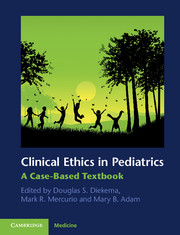Book contents
- Frontmatter
- Contents
- Contributors
- Preface
- Section 1 Core issues in clinical pediatric ethics
- Section 2 Ethical issues at the beginning of life: perinatology and neonatology
- Section 3 When a child dies: ethical issues at the end of life
- Section 4 Ethical issues posed by advances in medical technology and science
- Section 5 Children, public health, and justice
- Section 6 Special topics in pediatric ethics
- 37 Industry representatives, gift-giving, and conflicts of interest
- 38 Patient participation in medical training
- 39 Boundary issues in pediatrics
- 40 The impaired, incompetent, or unethical provider
- 41 Ethics committees and consultation services
- Index
- References
37 - Industry representatives, gift-giving, and conflicts of interest
from Section 6 - Special topics in pediatric ethics
Published online by Cambridge University Press: 07 October 2011
- Frontmatter
- Contents
- Contributors
- Preface
- Section 1 Core issues in clinical pediatric ethics
- Section 2 Ethical issues at the beginning of life: perinatology and neonatology
- Section 3 When a child dies: ethical issues at the end of life
- Section 4 Ethical issues posed by advances in medical technology and science
- Section 5 Children, public health, and justice
- Section 6 Special topics in pediatric ethics
- 37 Industry representatives, gift-giving, and conflicts of interest
- 38 Patient participation in medical training
- 39 Boundary issues in pediatrics
- 40 The impaired, incompetent, or unethical provider
- 41 Ethics committees and consultation services
- Index
- References
Summary
Case narrative
During an outpatient rotation in the pediatric gastroenterology clinic, Dr. Q (a second-year resident) finishes observing a colonoscopy in the operating room and returns to the Doctors’ Lounge with the Gastroenterology fellow and attending physician to take a short break before the next procedure. It is lunchtime, and they are hungry. The next procedure will start in 15 minutes, and the cafeteria line will be too long to get lunch and return before the next procedure starts. They all enter the lounge and immediately see a well-dressed man sitting at a table with a 3-foot-long sub sandwich, a plate of brownies, and a display of brand-name skin care dressings commonly used by surgeons, emergency rooms, and in pediatricians’ offices. He offers them all lunch. Dr. Q is particularly hungry, having skipped breakfast, and sees the fellow and staff physician accept a sub and a brownie. She pauses only a moment before filling a plate herself. The man at the table only mentions that his company is excited about this new product and hands over a brochure and pen with each plate of food, but demands no more of the physicians’ time. At the table, Dr. Q slides the pen into her pocket, briefly opens the brochure, but quickly engages in conversation with the fellow and attending physician, and leaves the brochure on the table as she departs.
A free lunch?
Of course, it is not surprising that in a stressful or busy situation thoughts often go quickly to self-preservation or, in this case, eating lunch. However, the acceptance of the food sets up a particularly powerful impulse to reciprocate in some way. A conflict of interest exists when professional judgment concerning a primary interest is unduly influenced by a secondary interest. In this case, the primary interest is good treatment of patients’ wounds to promote the most effective healing, and the secondary interest is satisfaction of personal hunger at lunchtime. Of course, it is not without careful consideration of marketing principles that the salesperson offers food to potential clients. By accepting the food from the salesman, a positive feeling is associated with the salesperson and with the brand-name of the product he represents. Furthermore, the acceptance of the food by the mentors of the resident reinforces that this type of behavior is acceptable even though there are consequences that they may not have carefully considered.
- Type
- Chapter
- Information
- Clinical Ethics in PediatricsA Case-Based Textbook, pp. 215 - 220Publisher: Cambridge University PressPrint publication year: 2011
References
- 1
- Cited by



